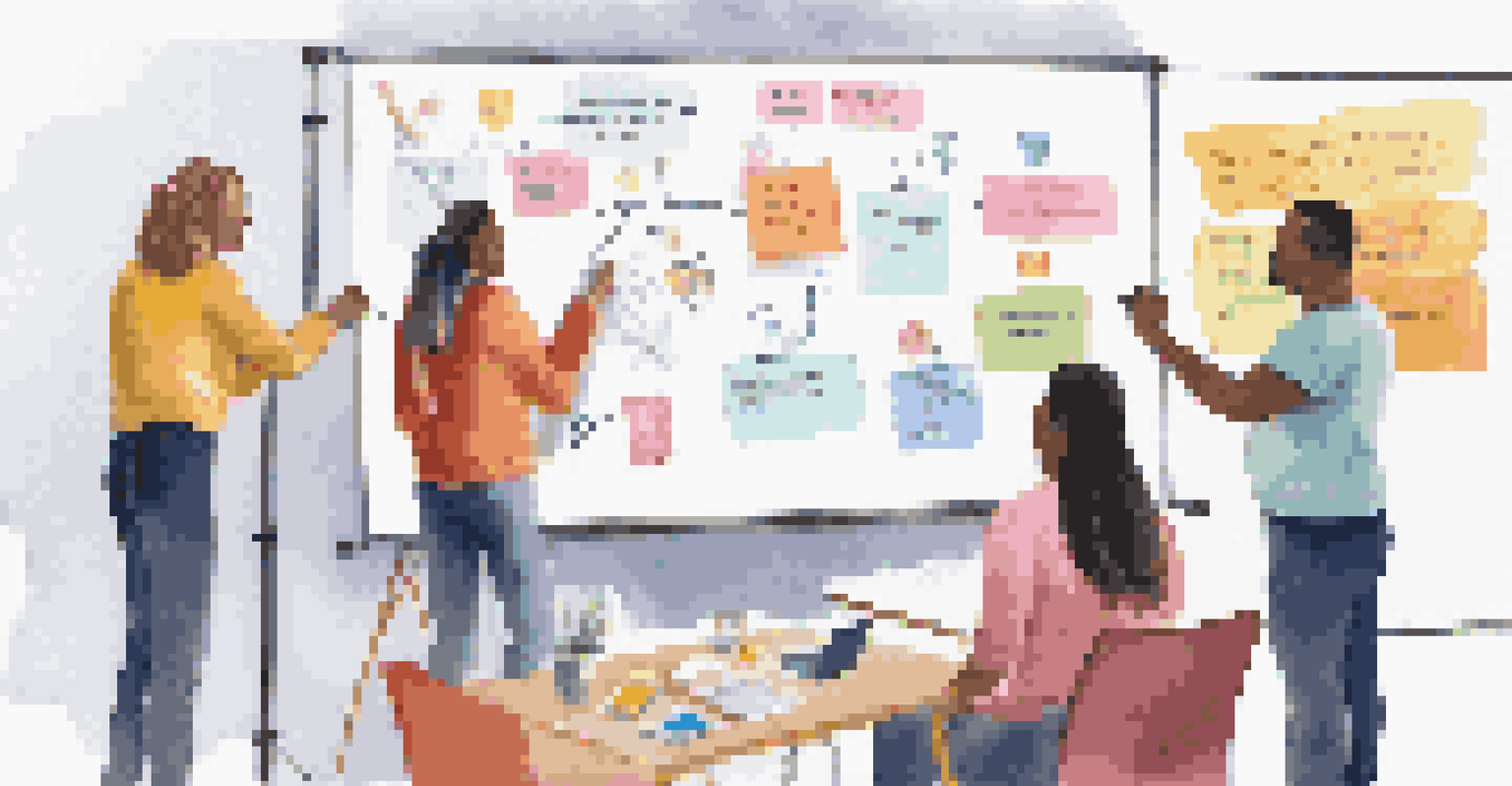How to Conduct Effective Career Goal Setting Workshops

Understanding the Importance of Career Goal Setting
Career goal setting is not just about identifying what you want; it's about creating a roadmap to get there. By establishing clear goals, individuals can stay focused and motivated, which ultimately leads to greater job satisfaction and success. Think of it like planning a road trip: without a destination, you might wander aimlessly.
Setting goals is the first step in turning the invisible into the visible.
Moreover, having defined career goals helps participants align their personal values with their professional aspirations. This alignment can lead to more meaningful work and a stronger commitment to achieving those goals. Imagine a compass guiding you in the right direction, ensuring every step you take is intentional.
In workshops, discussing the significance of career goals sets a strong foundation. It encourages participants to reflect on their ambitions and consider how these goals shape their overall career trajectory. By fostering this understanding, you're preparing them for a productive and engaging workshop experience.
Creating a Comfortable Workshop Environment
The atmosphere of your workshop can significantly impact its effectiveness. A comfortable, welcoming environment encourages participants to open up and share their thoughts. Consider arranging chairs in a circle instead of rows to facilitate conversation, much like a cozy gathering among friends.

In addition, using warm lighting and having light refreshments can make the space feel inviting. Personal touches, such as motivational quotes displayed around the room, can also inspire participants as they embark on their goal-setting journey. This supportive environment can lead to more meaningful discussions.
Set Clear Career Goals
Establishing specific career goals creates a roadmap that helps individuals stay focused and motivated on their professional journey.
Ultimately, when participants feel relaxed and valued, they are more likely to engage deeply with the content. This engagement is crucial for fostering collaboration and allowing participants to learn from each other's experiences and insights.
Incorporating Interactive Activities
Interactive activities are essential for keeping energy levels high during the workshop. Engaging participants through group discussions, role-playing, or brainstorming sessions can break the ice and promote collaboration. For example, a group exercise to list personal strengths can help participants recognize their unique capabilities.
Accountability is the glue that ties commitment to the result.
These activities not only make the workshop more enjoyable but also reinforce the learning objectives. When individuals actively participate, they are more likely to retain information and apply it to their career goals. Think of it as a potluck dinner, where everyone brings something to the table, enriching the overall experience.
By incorporating various interactive elements, you create a dynamic learning environment that fosters creativity and openness. This atmosphere encourages participants to think outside the box and explore new possibilities for their career paths.
Setting SMART Goals Together
Introducing the SMART framework can significantly enhance the goal-setting process. SMART stands for Specific, Measurable, Achievable, Relevant, and Time-bound. By guiding participants to set goals within this structure, you help them create clear and actionable plans.
For instance, instead of saying, 'I want to advance in my career,' a SMART goal would be, 'I will apply for a management position in my company within the next six months.' This level of specificity not only makes the goal more tangible but also provides a timeline for accountability.
Foster a Supportive Environment
Creating a comfortable workshop atmosphere encourages open communication and meaningful discussions among participants.
Encouraging participants to share their SMART goals with the group can foster a sense of community and support. It also opens the door for feedback, allowing individuals to refine their objectives further. By the end of the workshop, participants will leave with well-defined goals that they feel confident pursuing.
Facilitating Meaningful Discussions
Facilitating discussions is a crucial aspect of career goal setting workshops. By guiding conversations around personal aspirations, challenges, and experiences, you create a space for participants to learn from each other. Open-ended questions can encourage deeper reflection and dialogue, much like a gentle nudge to explore uncharted territory.
For instance, asking questions like, 'What obstacles have you faced in achieving your goals?' can help participants identify common challenges. This shared understanding fosters camaraderie and allows individuals to brainstorm solutions together, reinforcing the idea that they are not alone in their journeys.
Additionally, encouraging participants to share success stories can inspire and motivate others. Celebrating achievements, no matter how small, helps to build a positive atmosphere where everyone feels empowered to pursue their goals.
Providing Resources and Tools for Success
Equipping participants with resources and tools is essential for their continued growth after the workshop. This could include worksheets for tracking goals, articles, or access to online courses related to their career interests. Think of these resources as a toolkit that enables individuals to build their career path effectively.
You might also provide information about networking opportunities and mentorship programs that can help participants achieve their goals. Connecting them with additional support can make a significant difference in their journey, much like having a guide on a challenging hike.
Encourage Accountability and Follow-Up
Implementing follow-up strategies fosters a sense of community and keeps participants committed to their career goals.
By empowering participants with these resources, you instill confidence in their ability to take actionable steps towards their career aspirations. This ongoing support can lead to a lasting impact, encouraging individuals to stay committed to their goals long after the workshop concludes.
Encouraging Follow-Up and Accountability
Follow-up is a crucial component of any effective workshop. Without it, the enthusiasm generated during the session may fade away. Encouraging participants to schedule check-in meetings, either with you or with each other, can foster accountability and keep their goals top of mind.
You could also create a group chat or online forum where participants can share updates and celebrate their progress. This sense of community can help maintain motivation, similar to a running club where members cheer each other on during training.

Ultimately, by establishing a culture of accountability, you empower participants to take ownership of their career development. This ongoing support system reinforces the idea that goal setting is not a one-time event but a continuous journey.